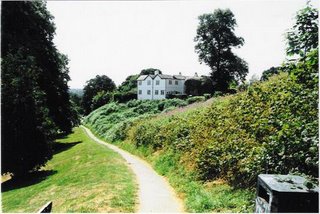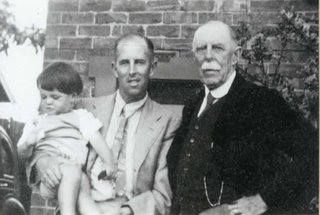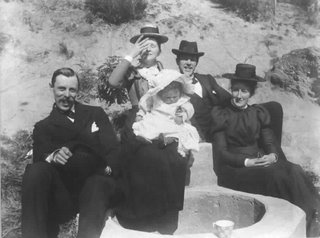 This is the second of three postings by David Enticott from his Masters Qualifying essay on the early influences on the preaching of F W Boreham.
This is the second of three postings by David Enticott from his Masters Qualifying essay on the early influences on the preaching of F W Boreham.The impact of nature on F W Boreham’s preaching, from 1891 to 1895, was borne out in two ways. Firstly there were some illustrations in his sermons that referred specifically to the creation, such as “snow on cottages.”[1] This was a pervasive image of newness in Christ that covered everything- all sins and mistakes. Another strong picture from the environment contained in these early sermon manuscripts, was called “arctic rivers.”[2] Here Boreham included a quotation to elaborate on what he meant. The quote stated: “Some Christians like the rivers which flow into the Arctic Ocean are frozen over at the mouths.”[3] Again this scene from nature may have been an effective illustration, as it could have been easy for a listener to picture what a frozen river might look like. To visualise an Arctic landscape filled with snow and icebergs.
Despite these references, it was only in his sermons after 1895 that Boreham allowed nature to have free reign.[4] As an example of this, on the 4th of February 1894 he delivered a message at Theydon Bois which was entitled “A word fitly spoken.”[5] The text for the day was Proverbs 25:11 and the headings chosen related both to the passage and the audience. It was a literal reading of the verse. By the time he reached Hobart and gave the same sermon in 1910, the title and headings had changed dramatically. The new theme was freed from a literal interpretation and modified to “Lips like Lilies.” [6] The headings read: “Some like thistles, some like poppies, some like violets, some like daisies.”[7] He thought that a person’s use of language could be thorny, misused, loving or divine. Nature was his means of explaining the point and as such it had been given its full voice. Here were the flowers and colours of the common at Tunbridge Wells coming to life. This use of the real world also allowed for the possibility of different interpretations, as a metaphor can be understood and pictured in different ways.
These relatively sparse references to the creation in his early sermons were nearly always used to illumine a theological or practical issue. When he spoke at Theydon Bois on the theme of Christians being released from condemnation,[8] Boreham used a scene from the natural world to make his point. Here there was a graphic backdrop of waves, wind and thunder, that only Christ could abate.[9] Such references to nature were still rare by the time Boreham left England in 1895. In his final four sermons at Theydon Bois in late 1894 he only used one illustration from creation.[10]
David Enticott
Image: From a Postcard of Theydon Bois in the F W Boreham Collection, Whitley College.
[1] F.W.Boreham. 1892. “Walk in the newness of life.” Sermon, Clapham, United Kingdom, 12 June, Preacher’s handwritten sermon manuscript. As with all of Boreham’s manuscripts, this illustration was denoted by a squiggly line underneath the key phrase of the story.
[2] F.W.Boreham. 1894. “A word fitly spoken.” Sermon, Theydon Bois, United Kingdom, 4 February, Preacher’s handwritten sermon manuscript.
[3] ibid.
[4] A notable exception, where Boreham did use nature as a guiding force, was a sermon entitled “Roots, Shoots and Fruits” from Theydon Bois in March 1894. Here he preached on a text taken from Matthew 7:20: “wherefore by their fruits ye shall know them” and said that Christians should be known not by their roots, or shoots but instead by their fruits. In this message he teased out some of these links with the natural world by holding that “it is well to be reminded that we are not saved by profession, sap brings shoots: not shoots sap.” In: F.W. Boreham. 1894. “Roots, Shoots, Fruits.” Sermon, Theydon Bois, United Kingdom, 25 March, Preacher’s handwritten sermon manuscript.
[5] ibid.
[6] F.W. Boreham. 1910. “Lips like Lilies.” Sermon, Hobart Baptist Church, Australia, 25 May, Preacher’s handwritten sermon manuscript.
[7] ibid.
[8] F.W. Boreham. 1894. “No condemnation.” Sermon, Theydon Bois, United Kingdom, 20 May, Preacher’s handwritten sermon manuscript.
[9] In this sermon Boreham said that Christians were accused but not condemned. To show what it was like to be accused he drew a mental picture for his hearers. This started with a lifeboat that was tossed about by the waves and the wind. There were clouds overhead and the sound of thunder all about. Christ was the one to bring relief in the midst of this dramatic scene. The clouds, waves and thunder may have provided his message with a convincing natural backdrop to the point he was trying to make- that Christ was able to rescue a disciple from danger, from condemnation. In: ibid.
[10] This was contained in a sermon on the second coming of Christ entitled: “Behold! I come quickly” taken from Revelation 22:12. The reference was to the impact Christ’s second coming would have on the “heavens- earth- sea.” F.W.Boreham.1894. “Behold! I come quickly.” Sermon, Theydon Bois, United Kingdom, 17 June, Preacher’s handwritten sermon manuscript.




